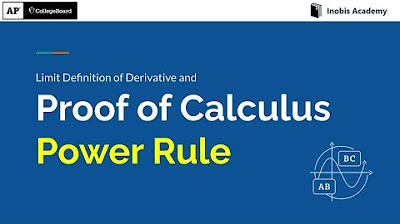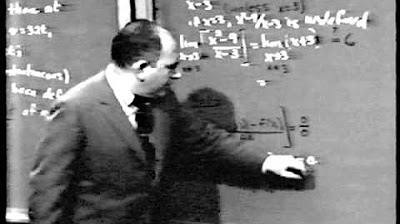Introductory Calculus Classes in a Nutshell
TLDRThe video script discusses the complexities and common pitfalls in introductory calculus courses, highlighting the importance of understanding the foundational concept of limits and the challenges in teaching and learning calculus without a strong algebraic base. It critiques the typical teaching methods that focus on rote application of formulas, such as the power rule, without fully explaining the underlying principles, leading to a superficial understanding of derivatives and integrals. The speaker advocates for a more rigorous educational approach that emphasizes comprehension over mere formula manipulation.
Takeaways
- 📚 The script discusses the complexities and misconceptions surrounding the teaching of calculus, particularly in introductory classes.
- 🤔 The author reflects on their personal experiences with calculus, highlighting the challenges faced in understanding its core concepts.
- 💡 The concept of limits is introduced as a fundamental basis for calculus, yet its intuitive understanding is often overlooked in standard curricula.
- 🔢 Limits are explained as the value a function approaches as 'x' nears a certain point, but not necessarily reaching it, which is a common point of confusion.
- 📈 Differentiation is introduced as the first part of calculus, often taught through the use of limits and various graphical tools like Desmos.
- 🚀 The power rule is mentioned as a key tool for differentiation, but its underlying principles are not always clearly explained to students.
- 🔄 Integrals are presented as the opposite of derivatives, but the connection between the two is not thoroughly explored in introductory courses.
- 📊 The concept of definite integrals as the area under a function's curve is touched upon, but the reasoning behind this is not deeply analyzed.
- 🧩 The script criticizes the approach of teaching calculus that focuses on rote application of formulas without a strong foundation in algebra.
- 🎓 The author suggests that the superficial understanding of calculus gained in introductory courses may lead to relearning the subject in higher education.
- 📝 The transcript is part of the author's English project and represents a significant effort in creating educational content.
Q & A
What is the primary purpose of advanced physics equations featuring squiggly lines and Greek alphabets?
-The primary purpose of these equations is to provide a mathematical framework for explaining complex physical phenomena in a concise and precise manner.
What is calculus and why is it considered to have a reputation?
-Calculus is a branch of mathematics that deals with rates of change and accumulation. It is considered to have a reputation due to its complexity and its fundamental role in understanding various scientific and engineering concepts.
In what order are topics typically introduced in a calculus course?
-Typically, a calculus course begins with an overview, followed by the introduction of limits, differentiation (denoted by derivatives), and then integration (denoted by integrals).
Why is the concept of limits considered fundamental in calculus?
-Limits are fundamental because they describe the behavior of functions as input values approach a certain point. This concept is crucial for understanding derivatives and integrals, which are the core components of calculus.
What is the Epsilon-Delta proof of a limit and why is it often skipped in introductory courses?
-The Epsilon-Delta proof is a rigorous definition of a limit that states that for any given distance epsilon away from a limit, there exists a corresponding distance delta such that the function's output is within epsilon of the limit when the input is within delta of a certain value. It is often skipped in introductory courses because it is highly abstract and challenging for beginners to grasp.
What is differentiation in calculus?
-Differentiation is the process of finding the derivative of a function, which represents the rate of change or the slope of the function at any given point.
What is the power rule in calculus and how is it used?
-The power rule is a simple method in calculus that allows you to differentiate functions of the form f(x) = x^n, where n is a constant. The power rule states that the derivative of such a function is f'(x) = n * x^(n-1).
What are integrals in calculus?
-Integrals are the reverse process of differentiation. They are used to find the original function (anti-derivative) when given a derivative or to calculate areas under curves (definite integrals).
Why are integrals considered harder to solve than derivatives?
-Integrals are considered harder to solve because they often involve more complex techniques and there are fewer general rules to apply compared to differentiation. Solving integrals may require knowledge of special functions and methods beyond the basic power rule.
What is the fundamental theorem of calculus and what does it state?
-The fundamental theorem of calculus states that integrals are the opposite of derivatives. Specifically, it connects the definite integral of a function to its derivative, stating that the area under the curve from one point to another can be found by evaluating the anti-derivative of the function at those points and subtracting the values.
Why is it important to have a strong algebraic base when learning calculus?
-A strong algebraic base is important because calculus involves complex algebraic manipulations and expressions. Without a solid understanding of algebra, students may struggle to comprehend and apply the formulas and concepts they encounter in calculus effectively.
Outlines
📚 Introduction to Calculus and Its Teaching Methods
This paragraph discusses the author's experience with calculus and the common approach to teaching it in introductory classes. The author explains that calculus is usually introduced through the concept of limits, which is fundamental but often not thoroughly understood. The paragraph highlights the lack of rigorous proofs, such as the Epsilon-Delta proof, in introductory courses and the focus on teaching methods that prioritize memorization over comprehension. The author also touches on the topics of differentiation and integration, noting that students are often taught formulas without a deep understanding of the underlying concepts. The paragraph concludes with a critique of this teaching style, arguing that it leads to confusion and a superficial understanding of calculus.
🤔 Critique of Calculus Education and Its Impact on Students
In this paragraph, the author expresses dissatisfaction with the way calculus is taught, suggesting that it lacks depth and often results in students not truly understanding the subject. The author argues that the focus on rote learning of formulas and procedures, such as the power rule for both derivatives and integrals, does not allow students to grasp the fundamental concepts of calculus. The paragraph emphasizes the importance of having a strong algebraic foundation to truly comprehend calculus and suggests that the current teaching methods may lead to students relearning the subject in university. The author concludes with a reflection on the effort put into the English project and the hope that the video will be shared, indicating the significance of the topic discussed.
Mindmap
Keywords
💡Advanced Physics Equations
💡Calculus
💡Limits
💡Epsilon-Delta Proof
💡Derivatives
💡Desmos Activity
💡Power Rule
💡Integrals
💡Fundamental Theorem of Calculus
💡Algebraic Manipulation
💡Conceptual Understanding
Highlights
The discussion begins with the curiosity surrounding advanced physics equations and their complex nature involving squiggly lines and Greek alphabets.
Calculus, a concept with a significant reputation, is introduced through various classes and courses, with the speaker having experienced multiple introductions and full courses.
The modern teaching method of calculus aims to be more intuitive, starting with an overview of the course and the introduction of limits.
Limits are a fundamental concept in calculus, representing the value a function approaches as 'x' gets closer to a certain value, which is essential to grasp for understanding calculus.
The Epsilon-Delta proof, a rigorous definition of a limit, is often skipped in introductory courses due to its complexity and the difficulty students face in understanding it.
Differentiation, the first part of calculus, is introduced using limits, but the connection between the two is not always clearly explained in introductory courses.
The process of learning calculus can be disorienting, with students often using formulas and methods without fully understanding the underlying concepts.
The power rule is introduced as a method for both differentiation and integration, but its true purpose and the reasoning behind it are not always clear to students.
Integrals, the opposite of derivatives, are introduced with a focus on indefinite integrals and the fundamental theorem of calculus, which connects the area under a curve to the slope of a function.
Definite integrals, represented as the area under a function from point A to point B, are more challenging to solve than derivatives and are often skipped in introductory courses.
The speaker argues that learning calculus without a strong foundation in algebra and understanding of the basics can lead to confusion and a superficial understanding of the subject.
The speaker shares their personal opinion that introductory calculus courses do not provide enough context or understanding, suggesting that students may need to relearn the material in university.
The transcript is part of an English project by the speaker, who has put significant effort into creating a comprehensive and engaging piece on the topic of calculus.
The speaker encourages the audience to share their content, emphasizing the effort put into the creation of the video.
Transcripts
Browse More Related Video

Episode 2 - Why is AP Physics so Hard?

The Basics of Business Education - What Business Students Should Study

Proof of the Calculus Power Rule using the Limit Definition of a Derivative.

Unit I: Lec 4 | MIT Calculus Revisited: Single Variable Calculus

Howard Gardner on Multiple Intelligences

Why teach calculus?: Daniel Ashlock at TEDxGuelphU
5.0 / 5 (0 votes)
Thanks for rating: